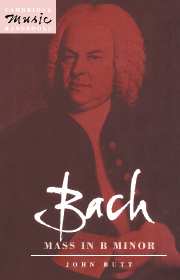Book contents
- Frontmatter
- Contents
- Preface
- List of abbreviations
- 1 The musical genre of the mass Ordinary
- 2 Genesis and purpose
- 3 Reception history
- 4 Text and music: the process of adaptation and composition
- 5 Ritornello forms
- 6 The influence of the dance
- 7 Counterpoint
- 8 Figurae and the motivic texture
- 9 Patterns and proportions: large-scale structuring and continuity in the Mass in B Minor
- Afterword
- Notes
- Select bibliography
- Index
2 - Genesis and purpose
Published online by Cambridge University Press: 05 June 2012
- Frontmatter
- Contents
- Preface
- List of abbreviations
- 1 The musical genre of the mass Ordinary
- 2 Genesis and purpose
- 3 Reception history
- 4 Text and music: the process of adaptation and composition
- 5 Ritornello forms
- 6 The influence of the dance
- 7 Counterpoint
- 8 Figurae and the motivic texture
- 9 Patterns and proportions: large-scale structuring and continuity in the Mass in B Minor
- Afterword
- Notes
- Select bibliography
- Index
Summary
The Missa of 1733
Only in the most superficial sense – and in retrospect – could Bach be regarded as the ideal candidate for the position of Kantor at the Thomas-schule in Leipzig in 1723. In evaluating his suitability, much depends on one's view of what the office should have entailed at that time. Historically the Kantor in a Lutheran school was primarily a school teacher (usually third in the hierarchy, under the Rektor and Konrektor) who had responsibility for practical music in the school and associated churches. But some factions on the town council believed that they should move with the times and appoint a composer of repute, someone who would enhance the cultural status of Leipzig rather than devote himself ‘merely’ to school duties. It was this body of opinion which succeeded in securing Bach for the post in 1723. Bach was not exactly the most up-to-date and popular composer of his age; Telemann was the first choice. But Bach was clearly first and foremost a musician and composer, someone who refused to teach Latin (and apparently even the regular singing classes) in the school, and someone who regarded himself as director of music for the whole town. His tenure was considered by many of his employers to be an exceptional situation, one which thankfully ceased at his death. Throughout the Leipzig years Bach was thwarted by those on the town council who would have preferred a traditional Kantor and not a town Kapellmeister.
- Type
- Chapter
- Information
- Bach: Mass in B Minor , pp. 7 - 24Publisher: Cambridge University PressPrint publication year: 1991

